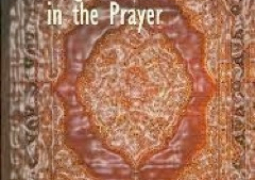
Funeral Prayer for an Absentee and for a Person who has Disappeared
Offering a funeral prayer for an absent person in another city is permissible, whether the city is near or far. In such a case those offering funeral prayer should stand facing the qiblah, even if the city where the absentee is located is not in the direction of the qiblah. After making an intention to pray for the absentee, takbirs should be said as they are normally said in funeral prayer over a deceased who is present. This is based on a hadith reported by the group on the authority of Abu Hurairah that the Prophet, peace be upon him, informed people about the death of Negus the day he died, and then took them out to offer funeral prayer for him. There he arranged his Companions in rows and said four takbirs. Ibn Hazm said: “The funeral prayer for an absentee may be performed by a group of people under an imam. The Prophet, peace be upon him, offered a funeral prayer for Negus, who had died in Ethiopia, with his Companions standing in rows behind him. There is consensus among the Companions regarding this issue, and it should not be overlooked. Abu Hanifah and Malik, however, disagree with this view, but they have no ground for this disagreement.”
Offering Funeral Prayer in a Mosque
There is no harm in offering funeral prayer in a mosque, if there is no danger of it becoming unclean. This is based on a narration of Muslim from ‘Aishah who said: “The Prophet, peace be upon him, offered a funeral prayer for Suhail ibn Baida in the mosque, and the Companions likewise offered funeral prayer for Abu Bakr and ‘Umar in the mosque, and no one objected to it, because the funeral prayer is similar to other (formal) prayer. ‘ Abu Hanifah and Malik do not approve of it, citing a hadith of the Prophet, peace be upon him, to the effect that whoever offers a funeral prayer in the mosque would have nothing (i .e. no reward) . This statement not only contradicts the practice of the Prophet, peace be upon him, and his Companions, but is also a weak hadith due to other reasons. Ahmad ibn Hanbal said: “This is a weak hadith, and is reported through a single transmitter, Salih, the freed slave of Al-Tawamah, and he is an unreliable narrator. Some scholars, however, hold that this hadith of the Prophet, peace be upon him, is sound, and the words, reported by Abu Daw’ud, “Whoever offers a funeral prayer in a mosque would have nothing,” mean such a person would not incur any burden (of sin). Ibn Al-Qayyim said: ‘It was not the usual practice of the Prophet, peace be upon him, to offer a funeral prayer in the mosque. Rather he would usually offer funeral prayers outside the mosque except when for some reason he had to offer it in the mosque. In certain cases he did offer funeral prayer in the mosque, as in the case of Ibn Baida, which shows that funeral prayer may be offered either inside or outside the mosque, but to do so outside the mosque is preferable.”
Funeral Prayer in the Graveyard
A majority of jurists disapprove of offering funeral prayer in a graveyard. This is the view of ‘Ali, Abd’Allah ibn ‘Amr, and Ibn ‘Abbas, and also of ‘Ata, An-Nakh’i, Ash-Shafi’i, Ishaq, and Ibn Al- Munzhir, and they cite the Prophet’s hadith: “The entire earth is a mosque except for a graveyard and a bathroom.” In a report from Ahmad it is said: “There is no harm in offering a funeral prayer (as distinct from formal Salah) in a graveyard as the Prophet, peace be upon him, himself offered a funeral prayer over a deceased while he was buried in his grave. Abu Hurairah also offered a funeral prayer over the grave of ‘Aishah in the middle of the cemetery of Al-Baqi’, which was attended by Ibn ‘Umar. And ‘Umar ibn Abdal-’Aziz did likewise.”
Women are Permitted to Offer Funeral Prayers
A woman, like a man, may offer a funeral prayer, singly or in a congregation. In fact, once when Umm ‘Abdallah offered funeral prayer for ‘Utbah, ‘Umar waited until she finished. ‘Aishah ordered the body of Sa’d ibn Abi Waqqas to be brought to her so that she could offer a funeral prayer over him. An-Nawawi said: “Women may offer (funeral) prayer in congregation just as they are permitted to perform other Sunnah prayers. Al-Hasan ibn Saleh, Sufiyan Al-Thawri, Ahmad, and the Hanafi School also hold the same view. Malik, however, is of the opinion that women should offer the funeral prayer individually.
The Most Worthy Person to Lead a Funeral Prayer
Jurists differ as to the most worthy person to lead a funeral prayer. Some said: “The most appropriate person is the legal guardian of the deceased, then the (Muslim) ruler, then the father of the deceased, grandfather, or great grandfather, then the son or the grandson, then the one closest in relationship. This is the opinion of the Maliki and Hanbali schools. Others said: The best person is the father, then the grandfather, then the son, then the grandson, then the brother, then the nephew, then the paternal uncle, and then his son in accordance with their blood ties with the deceased. This is the opinion of AshShafi’i and Abu Yusaf. Abu Hanifah and Muhammad ibn Al-Hasan, however, are of the opinion that the preferred order is the (Muslim) ruler if present at the funeral, then the judge, then the imam of the locality, then the guardian of a deceased woman, then the nearest blood relative. Of the blood relatives, if both father and his son are present, the father should be given precedence.
To be continued



